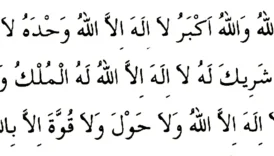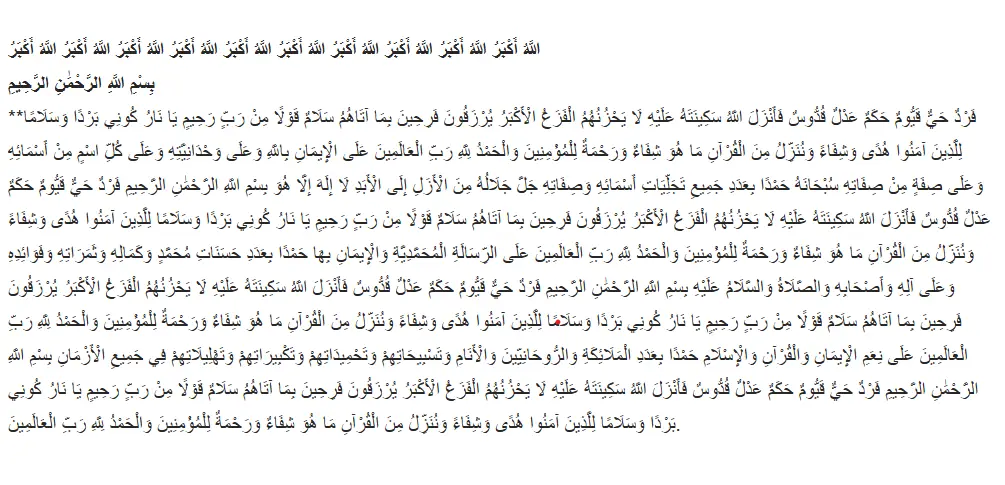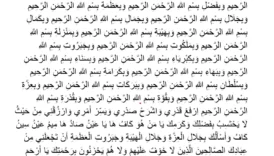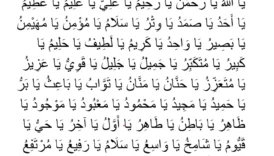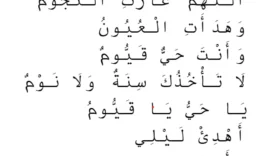The Deed That Earns the Prayer of Seventy Thousand Angels and Its Virtue
Islamic Prayers |This article examines the hadith (prophetic narration) which mentions the glad tidings that seventy thousand angels pray for the person who recites the last three verses of Surah Al-Hashr in a specific manner in the morning and evening, and that they are considered a martyr if they die that day. The importance of angels’ prayers and the virtue of this deed are explained.
- The Deed That Earns the Prayer of Seventy Thousand Angels and Its Virtue
- The Nature of Angels and Their Prayers for Believers
- The Specific Deed Earning the Prayer of Seventy Thousand Angels
- How to Perform the Deed and What to Recite
- Deep Meanings and Virtue of the Last Verses of Surah Al-Hashr
- The Place of Sincerity and Reflection in Deeds
- Final Word
- Bibliography / Sources
The Nature of Angels and Their Prayers for Believers
In Islamic belief, angels are subtle beings created by Allah Almighty from light, unseen by the naked eye, incapable of sinning, and constantly in obedience and worship to Allah (Fatir, 35:1; At-Tahrim, 66:6). They do not have human needs like eating, drinking, sleeping, or marrying, nor do they have gender. They execute Allah’s commands perfectly and are assigned various duties. Some are responsible for bringing revelation (Angel Jibril/Gabriel PBUH), some for managing natural phenomena (Angel Mikail/Michael PBUH), some for taking souls (Angel Azrail PBUH), and some for signaling the Day of Judgment (Angel Israfil PBUH). Besides these, there are countless other angels, such as the Kiraman Katibin (Noble Scribes) who record human deeds, the Hamalat al-‘Arsh (Bearers of the Throne), and angels who pray and seek forgiveness for believers.
The fact that angels pray for believers is a great divine blessing established by the Holy Quran and hadiths. Our Lord says: “Those [angels] who carry the Throne and those around it exalt [ Allah ] with praise of their Lord and believe in Him and ask forgiveness for those who have believed, [saying], ‘Our Lord, You have encompassed all things in mercy and knowledge, so forgive those who have repented and followed Your way and protect them from the punishment of Hellfire. Our Lord, and admit them to gardens of perpetual residence which You have promised them and whoever was righteous among their fathers, their spouses and their offspring. Indeed, it is You who is the Exalted in Might, the Wise. And protect them from the evil consequences [of their deeds]. And he whom You protect from evil consequences that Day – You will have bestowed mercy upon him. And that is the great attainment.'” (Ghafir [Al-Mu’min], 40:7-9).
These verses clearly show how even the angels who carry the Throne and are closest to Allah pray and seek forgiveness for the believers. What a great honor and glad tiding their prayers are for the believers!
Prophet Muhammad (peace and blessings be upon him) also informed us on various occasions that angels pray for believers:
- Angels pray for the one who stays in the place where they prayed, as long as they maintain their ablution, saying, “O Allah! Bestow Your mercy on him, forgive him, accept his repentance!” (Bukhari, Salat, 87; Muslim, Masajid, 276).
- Allah and His angels send blessings (pray for mercy and forgiveness) upon those who stand in the first row in congregational prayer and those who fill the gaps in the rows (Abu Dawud, Salat, 93; Nasa’i, Imamah, 31).
- Allah, His angels, the inhabitants of the heavens and the earth, even the ant in its hole and the fish in the sea, pray for the one who teaches good to people (Tirmidhi, ‘Ilm, 19).
- When a Muslim visits their sick brother, seventy thousand angels pray for them and seek their forgiveness until the evening (if visited in the morning) or until the morning (if visited in the evening) (Tirmidhi, Jana’iz, 2; Ibn Majah, Jana’iz, 2).
- The supplication a Muslim makes for his brother in his absence is answered. An angel is appointed near his head; whenever he supplicates for good for his brother, the appointed angel says, “Amin! And may you also have the same” (Muslim, Dhikr, 86, 88).
These examples show that angels desire good for believers and are constantly praying for them. Therefore, how important it is for a believer to strive to perform deeds that attract the prayers of angels!
The Specific Deed Earning the Prayer of Seventy Thousand Angels
Besides the general prayers of angels for believers, hadiths give glad tidings that a much larger number of angels will pray for those who perform specific deeds. One of the most significant of these glad tidings concerns the one who recites the last three verses of Surah Al-Hashr in the morning and evening.
Ma’qil ibn Yasar (may Allah be pleased with him) narrated that the Messenger of Allah (peace and blessings be upon him) said:
“Whoever says three times in the morning, ‘A’udhu billahi’s-sami’il-‘alimi minash-shaytanir-rajim’ (I seek refuge in Allah, the All-Hearing, the All-Knowing, from the accursed Satan), and then recites the last three verses of Surah Al-Hashr, Allah will appoint seventy thousand angels to pray for him until the evening. If he dies on that day, he dies as a martyr. Whoever recites them in the evening, will have the same status until the morning; seventy thousand angels will pray for him, and if he dies that night, he dies as a martyr.” (Tirmidhi, Fada’il al-Qur’an, 22; Darimi, Fada’il al-Qur’an, 22; Ahmad ibn Hanbal, Musnad, V, 26).
This hadith contains two great glad tidings for believers:
- The Prayer of Seventy Thousand Angels: Whoever performs this deed in the morning, seventy thousand angels pray and seek forgiveness for him until the evening, and whoever performs it in the evening receives the same until the morning. It is an unimaginably great blessing for countless angels – sinless beings whose prayers are accepted – to pray for a person for hours. It is hoped that through the blessings of these prayers, the person’s affairs in this world and the hereafter will be eased, and they will be protected from calamities and tribulations.
- The Glad Tiding of Martyrdom: It is promised that whoever dies on the day or night they perform this deed will attain the rank of martyrdom. Considering the lofty status of martyrdom in Islam, this too is an exceptionally great virtue.
How to Perform the Deed and What to Recite
The deed required to attain these great rewards mentioned in the hadith is as follows:
- In the Morning or Evening: This can be done after the Fajr (dawn) prayer or after sunrise, and after the Maghrib (sunset) prayer or after sunset.
- Seek Refuge Three Times (Isti’adha): First, recite the following Isti’adha phrase three times:اَعُوذُ بِاللهِ السَّمِيعِ الْعَلِيمِ مِنَ الشَّيْطَانِ الرَّجِيمِTransliteration: A’udhu billahi’s-sami’il-‘alimi minash-shaytanir-rajim.Meaning: I seek refuge in Allah, the All-Hearing, the All-Knowing, from the accursed Satan.Seeking refuge in Allah (isti’adha) before reciting the Quran is a command from our Lord (An-Nahl, 16:98). This specific form of isti’adha, as mentioned in the hadith, emphasizes seeking refuge in His protection with complete submission by invoking His attributes of being All-Hearing (As-Sami’) and All-Knowing (Al-‘Alim).
- Last Three Verses of Surah Al-Hashr: After the isti’adha, recite the last three verses of Surah Al-Hashr (verses 22, 23, and 24) once:Verse 22:هُوَ اللّٰهُ الَّذ۪ي لَٓا اِلٰهَ اِلَّا هُوَۚ عَالِمُ الْغَيْبِ وَالشَّهَادَةِۚ هُوَ الرَّحْمٰنُ الرَّح۪يمُTransliteration: Huwallahul-ladhi la ilaha illa Hu(wa), ‘alimul-ghaybi wash-shahadah, Huwar-Rahmanur-Rahim.Meaning: He is Allah, other than whom there is no deity, Knower of the unseen and the witnessed. He is the Entirely Merciful, the Especially Merciful.Verse 23:هُوَ اللّٰهُ الَّذ۪ي لَٓا اِلٰهَ اِلَّا هُوَۚ اَلْمَلِكُ الْقُدُّوسُ السَّلَامُ الْمُؤْمِنُ الْمُهَيْمِنُ الْعَز۪يزُ الْجَبَّارُ الْمُتَكَبِّرُۜ سُبْحَانَ اللّٰهِ عَمَّا يُشْرِكُونَTransliteration: Huwallahul-ladhi la ilaha illa Hu(wa), al-Malikul-Quddusus-Salamul-Mu’minul-Muhayminul-‘Azizul-Jabbarul-Mutakabbir. Subhanallahi ‘amma yushrikun.Meaning: He is Allah, other than whom there is no deity, the Sovereign, the Pure, the Perfection, the Bestower of Faith, the Overseer, the Exalted in Might, the Compeller, the Superior. Exalted is Allah above whatever they associate with Him.Verse 24:هُوَ اللّٰهُ الْخَالِقُ الْبَارِئُ الْمُصَوِّرُ لَهُ الْاَسْمَٓاءُ الْحُسْنٰىۜ يُسَبِّحُ لَهُ مَا فِي السَّمٰوَاتِ وَالْاَرْضِۚ وَهُوَ الْعَز۪يزُ الْحَك۪يمُTransliteration: Huwallahul-Khaliqul-Bari’ul-Musawwiru lahul-asma’ul-husna. Yusabbihu lahu ma fis-samawati wal-ard, wa Huwal-‘Azizul-Hakim.Meaning: He is Allah, the Creator, the Inventor, the Fashioner; to Him belong the best names. Whatever is in the heavens and earth is exalting Him. And He is the Exalted in Might, the Wise.
Deep Meanings and Virtue of the Last Verses of Surah Al-Hashr
These three noble verses declare the essence of Allah Almighty, His Oneness (Tawhid), His unique attributes, and His most beautiful names (Asma ul Husna) in a magnificent style.
- Emphasis on Tawhid: All three verses begin with “Huwallahul-ladhi la ilaha illa hu” (He is Allah, other than whom there is no deity), strongly emphasizing the belief in Tawhid, the reality that Allah is One and unique.
- Attribute of Knowledge: It is stated that Allah knows the unseen and the witnessed (‘Alim al-ghaybi wash-shahadah). Nothing is hidden from His knowledge.
- Attributes of Mercy: His attributes of Ar-Rahman (the Entirely Merciful to all creation in this world) and Ar-Rahim (the Especially Merciful, only to believers in the Hereafter) are mentioned.
- Asma ul Husna (Most Beautiful Names): Many beautiful names of Allah are mentioned in the verses: Al-Malik (The Sovereign), Al-Quddus (The Holy, The Pure), As-Salam (The Source of Peace), Al-Mu’min (The Granter of Security), Al-Muhaymin (The Guardian), Al-‘Aziz (The Almighty), Al-Jabbar (The Compeller), Al-Mutakabbir (The Supreme), Al-Khaliq (The Creator), Al-Bari’ (The Inventor), Al-Musawwir (The Fashioner), Al-Hakim (The Wise). Reflecting on these names helps us know Allah better and increase our faith in Him.
- Tasbih (Glorification): It is stated that everything in the heavens and the earth glorifies Allah (tasbih), meaning they declare Him free from any imperfection and exalt Him.
Because these verses describe Allah’s majesty, power, knowledge, mercy, and creativity so eloquently, some scholars have suggested they contain the “Ism al-A’zam” (Allah’s Greatest Name) (Al-Qurtubi, XVIII, 30). It is due to these profound meanings and the manifestation of divine names that reciting these verses leads to great virtues.
The Place of Sincerity and Reflection in Deeds
It must be remembered that the value of deeds in the sight of Allah depends on the sincerity of intention (niyyah) and purity of heart (ikhlas). The Prophet Muhammad (peace and blessings be upon him) said, “Actions are judged only by intentions. Every person will have only what they intended.” (Bukhari, Bad’ al-Wahy, 1; Muslim, Imarah, 155).
While performing this deed with the intention of attaining great rewards like the prayer of seventy thousand angels or the rank of martyrdom is permissible, the primary goal should be to seek Allah’s pleasure, remember Him, contemplate His greatness, and seek refuge in Him from the evil of Satan.
Instead of merely pronouncing the words, contemplating their meanings (tafakkur, tadabbur), feeling awe before Allah’s majesty, and directing the heart towards Allah while reciting will multiply the reward and impact of the deed manifold. Our Lord greatly values sincere devotion from the heart and efforts to know Him.
Final Word
It is a special favor and honor from Allah Almighty for luminous and innocent beings like angels to pray for a human being. The hadith narrated by Ma’qil ibn Yasar (r.a.) conveys the unique glad tidings that seventy thousand angels will pray for hours for the person who recites the last three verses of Surah Al-Hashr according to the prescribed method in the morning and evening. Furthermore, the promise of martyrdom for the one who dies on that day or night multiplies the virtue of this deed.
What a great opportunity and manifestation of mercy our Lord offers us, His weak servants! We should strive to make this precious deed a part of our lives, illuminating our mornings and evenings with these blessed verses and the prayers of the angels.
However, as with all acts of worship, we must not forsake sincerity and purity of intention in this deed. Our intention should solely be for the pleasure of Allah; while reciting, we should contemplate the meanings and realize our own inadequacy before the infinite power and mercy of our Lord.
May my Lord make us among His fortunate servants who perform this and similar virtuous deeds with sincerity, who receive the prayers of the angels, and who attain lofty ranks like martyrdom at their final breath. May His mercy and grace be upon us all. Amin.
Bibliography / Sources
- Ahmad b. Hanbal. al-Musnad. Istanbul: Çağrı Yayınları, 1992.
- Bukhari, Muhammad b. Ismail. al-Jami’ al-Sahih. Istanbul: Çağrı Yayınları, 1992.
- Darimi, Abdullah b. Abdurrahman. Sunan al-Darimi. Istanbul: Çağrı Yayınları, 1992.
- Abu Dawud, Sulayman b. Ash’ath al-Sijistani. Sunan Abi Dawud. Istanbul: Çağrı Yayınları, 1992.
- Ibn Majah, Muhammad b. Yazid. Sunan Ibn Majah. Istanbul: Çağrı Yayınları, 1992.
- Al-Qurtubi, Abu ‘Abdillah Muhammad b. Ahmad. al-Jami’ li Ahkam al-Qur’an. Beirut: Mu’assasat ar-Risalah, 2006.
- Muslim, Abu al-Husayn Muslim b. Hajjaj. al-Jami’ al-Sahih. Istanbul: Çağrı Yayınları, 1992.
- Nasa’i, Abu ‘Abdirrahman Ahmad b. Shu’ayb. Sunan an-Nasa’i. Istanbul: Çağrı Yayınları, 1992.
- Tirmidhi, Abu ‘Isa Muhammad b. ‘Isa. al-Jami’ al-Sahih (Sunan al-Tirmidhi). Istanbul: Çağrı Yayınları, 1992.
- Translation of the Meanings of the Quran. Presidency of Religious Affairs Publications (or specify another known English translation source).

